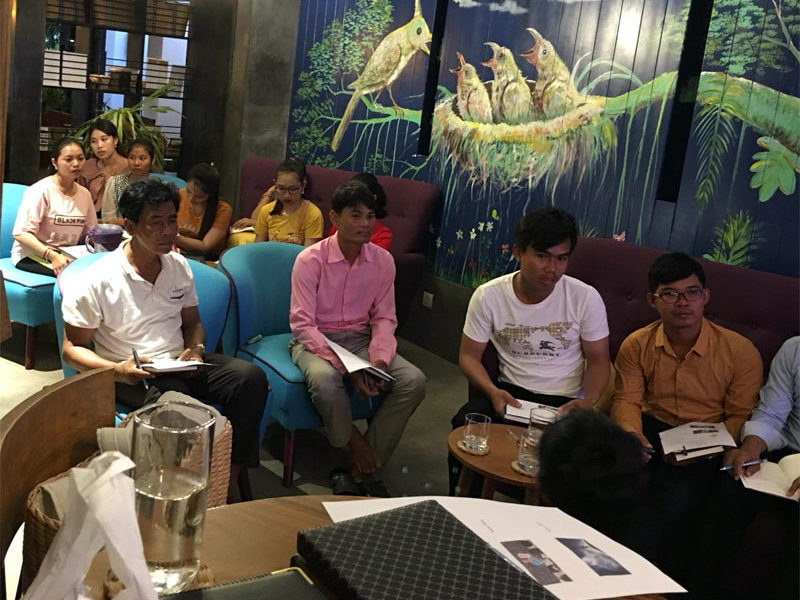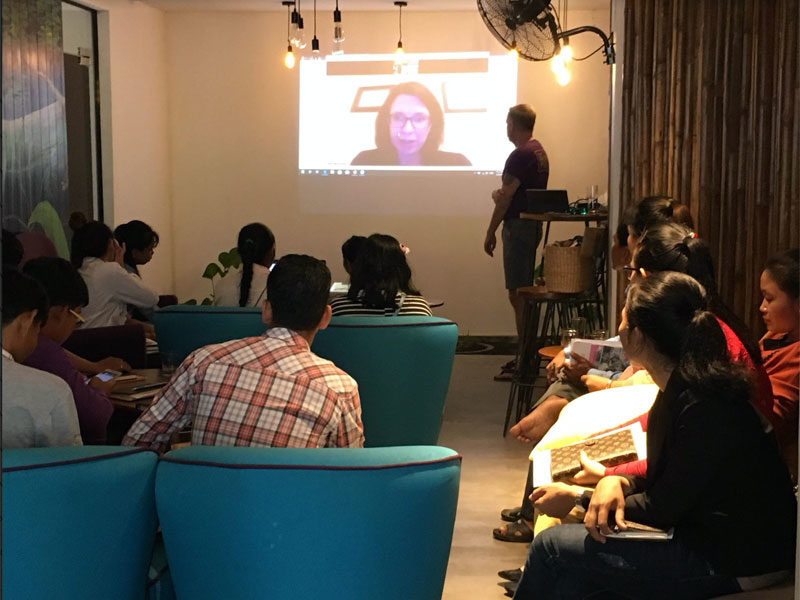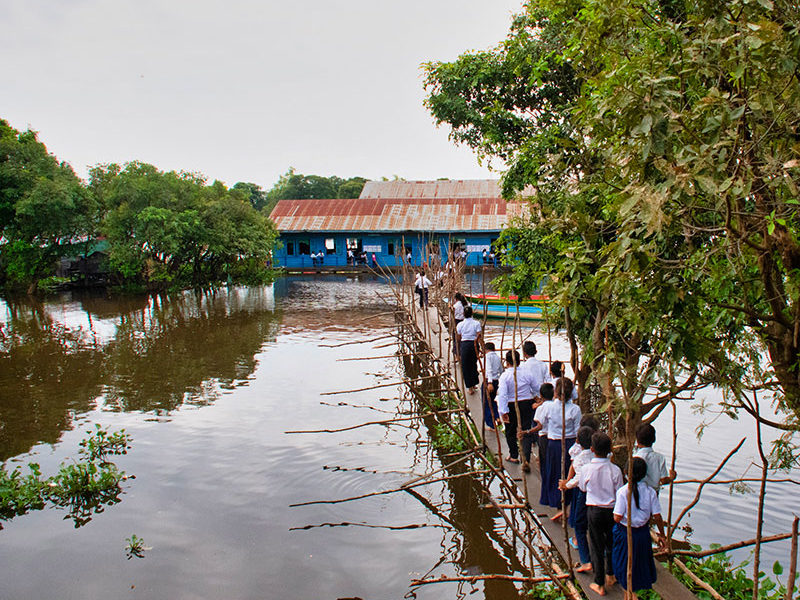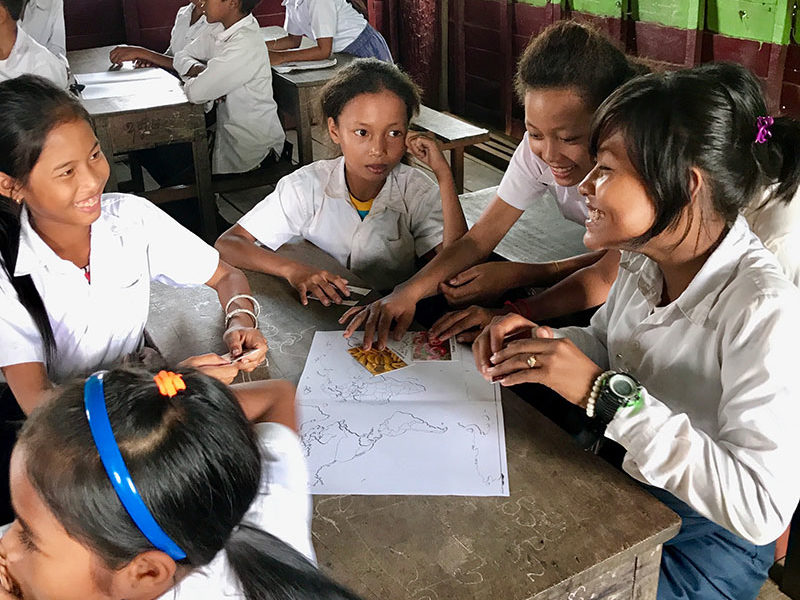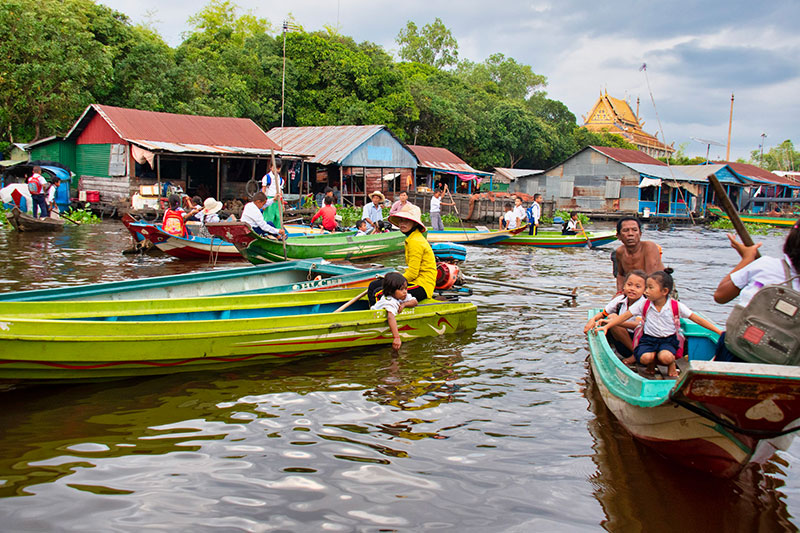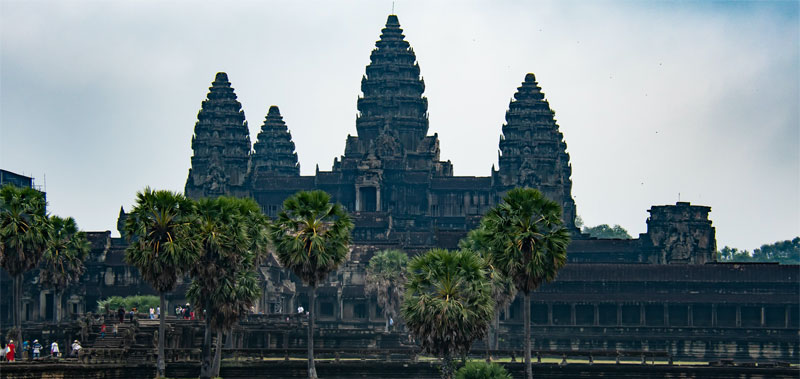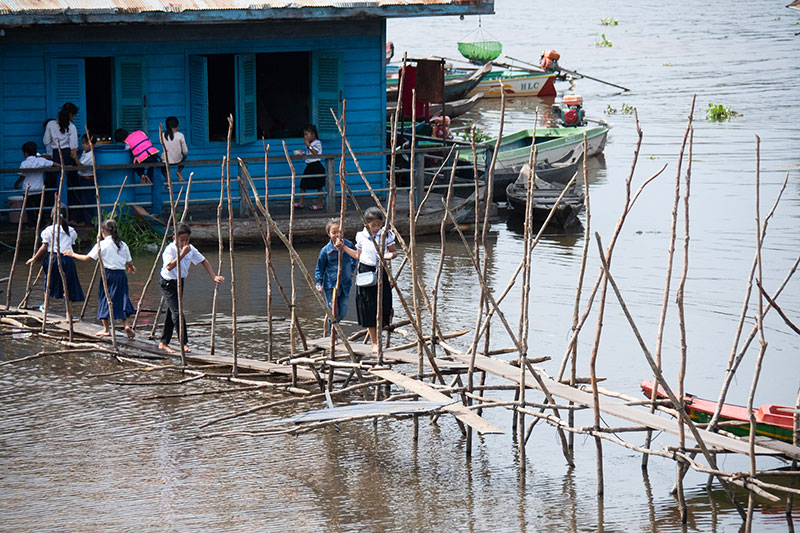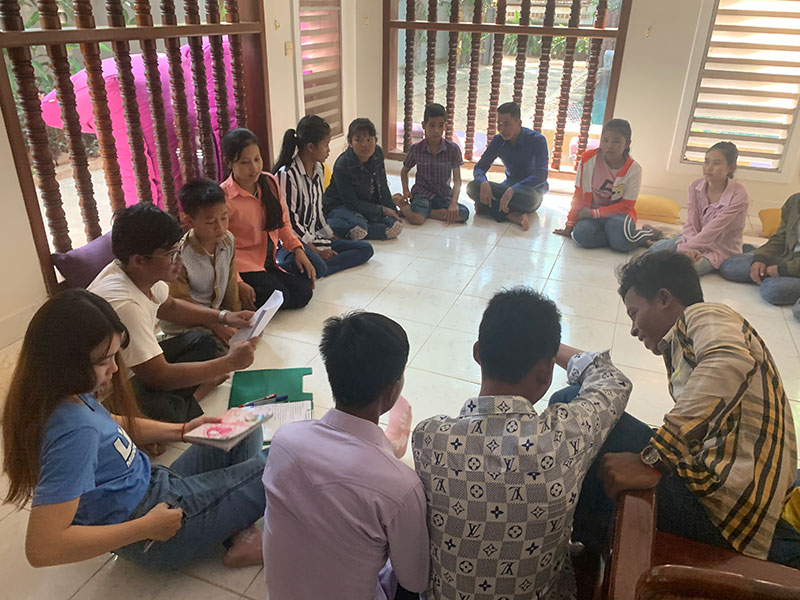Helping teachers in a Cambodian floating village
Keeping afloat
Jennifer McMahon ’96, ’16W (EdD) is helping teachers in a Cambodian floating village
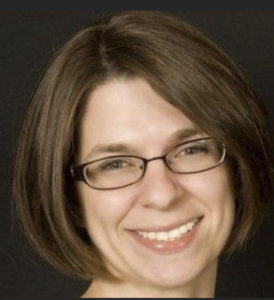
Jennifer McMahon ’96
By day, Jennifer McMahon ’96, ’16W (EdD) works as the director of learning for the Livonia Central School District. By morning and night, she commutes to Cambodia—via Zoom, and takes part in a 6 a.m. English class with teachers who are striving to keep up their English and hone their teaching skills.
McMahon started working with these Cambodian teachers in the spring of 2019. That’s when a Livonia High School graduate who was living in Cambodia asked her to consider creating a sister school relationship with a floating village in Cambodia.
“I immediately envisioned our young students connecting with young Cambodian students, reading the same books, and video chatting about their different perspectives,” says McMahon, who soon learned that the Cambodian schools didn’t have Internet, reliable electricity, or even enough books for their students in this floating village. According to her, only about half of the teachers there had two years of provincial teacher training and the other half had only a 12th-grade education with no formal teacher training.
McMahon realized that she could make the biggest difference by offering professional learning experiences to the village’s teachers. So, she planned a remote “Teacher Institute” for teachers in the Prek Toal floating village in March of 2019.
Getting started
McMahon ran the institute like a conference, with a weekend in a Siem Reap hotel, then owned by the Livonia alumnus. The institute focused on discussion, writing assignments, and student engagement strategies. To help her, McMahon engaged several teacher volunteers from the Rochester area as well as translators in Cambodia. For many of the 19 Cambodian teachers in attendance, it was their first time in a hotel, first time participating in any professional development program, and first time leaving the village.
They all used Zoom before Zoom was what everyone was using.
The teachers loved the institute. Afterward, they brought learnings into their floating classrooms and started applying new techniques. They were excited and wanted more, so McMahon evolved the program into a Teacher Leader Academy (TLA) which still continues—through Zoom—to help teachers become leaders, coaches, and mentors, all while building a repertoire of teaching strategies.
For the TLA, McMahon draws on her experience as a University of Rochester undergraduate as well as a Warner alumna. “Before going to the University of Rochester, I really only knew about other places through reading and a few formative conversations with exchange students as a child,” she says. “My undergrad and graduate education allowed me to meet people from other places and explore different perspectives through my varied coursework. I then became even more curious about other places and driven to try to make a difference in the world.”
Once McMahon started working with the Cambodian teachers, she wanted to do more to help them. “They are all so committed to making a brighter future for their students and their country—a place that has a recently tragic past yet one that is preceded by a proud history,” she adds. “I am amazed by everyone’s grit, determination, and commitment to education and sustainable improvement.”
Feet on the ground
It soon became clear to McMahon that she needed to meet the Cambodian teachers in person. And so, she went to Cambodia in November of 2019. She led in-person TLA sessions and she dug into ways to help the teachers help their students write across genres and engage with each other—techniques McMahon had been using forever but were new to the Cambodians.
They even went on an overnight field trip with about a dozen middle school students. “It was another first for everyone,” says McMahon. “We went to an art museum; to Angkor Wat; and to Phare, a circus that was a lot like Cirque du Soleil. Everyone was so excited and eager to learn, write, and talk about their experience—they still talk about it.” Soon after that, the Cambodian teachers took several other students’ groups on similar field trips.
Being humble
Students were getting it, too. They were responding to new ways to share ideas with one another. “At first, teachers and students were reluctant to give opinions,” says McMahon. “Culturally, it’s just not done. But, exploring ways to do that got them excited and it engaged them.”
McMahon adds that having cultural humility is key to her involvement. “I don’t have all the answers, and I’m not there to do things for them or push ‘my way’,” she says. “I’m there to give them techniques, to lift up ideas, and to help them identify strategies to teach what is important to them. I always need to remember that this is a culture and a community that has endured significant trauma and hardship. Sharing, partnering, and being respectful is essential.”
Just keep swimming
Things were all going well, which was leading to the next step for McMahon—to share the TLA with more teachers in Cambodia. She was poised to do so, too. She had a plane ticket and was ready to go to Cambodia again in April 2020. But then, COVID-19 happened.
“Although they didn’t have wide community spread, tourism halted and the schools shut down, forcing us to refocus,” she says. “It was heartbreaking to learn about how things were changing over there. People had to go back to the countryside as there were no longer many jobs in the city. Many of these people were just starting to make it, too, and now they weren’t. These are similar challenges to what many continue to face here—they live so close to the edge and are barely making ends meet. It’s interesting to see the parallels between cultures.”
New developments
The pandemic has been a catalyst for changing how teachers everywhere work with students. “We had to improvise,” she says. “For instance, in both Livonia and Cambodia, there were students who did not have access to the Internet. We needed to figure out how to reach and engage them.” She adds that in Cambodia teachers often would take a boat across the village’s Tonie Sap Lake to meet with students. In Livonia, teachers took a similar tact, for instance, meeting with students in driveways. These were safe, socially-distanced solutions teachers came up with for students without Internet access.
COVID-19 has prompted a new development for the TLA, too. This past summer, McMahon was a guest on a podcast hosted by Craig Hansen, director of the University of Applied Research and Development in New Zealand. She talked about her work as a school leader and she discussed the program in Cambodia. Hansen was intrigued, as his university offers an online master’s teaching program.
“We saw how our program could mirror theirs from a bachelor’s perspective,” says McMahon. “So right now, we are codifying our curriculum to more formally match their program.” The goal is to have the TLA evolve into an accredited bachelor’s degree program, from which teachers could easily transition to the New Zealand-based master’s program.
Get involved
Presently, there is no funding for the program; McMahon and others volunteer their time and expertise. “In addition to funding, I am also hoping to find people, like fellow alumni, to remotely teach the modules I have created or even be a guest lecturer for a class.” She plans to use a crowd-sourcing model to create a robust learning experience for Cambodian educators with limited resources.
McMahon notes how she has been given the gift of literacy and the ability to question and critique. She is grateful for all that her access to education has provided for herself and her family. “Although I do love feeling like I am using my education to help others, I do this mostly because it brings me such great joy.”
If interested in learning more and getting involved in McMahon’s Cambodia work, contact her at mcmahon.jen@gmail.com.
The University of Rochester recently launched Together for Rochester, a one-year campaign to make life better for the University community and the world—just like McMahon and many of our alumni are doing in their lives and careers. Learn more about the campaign here.
— Kristine Thompson, January 2021



